There are hundreds of biceps workouts for mass online, but most contain lousy advice.
For instance, many promote routines containing endless high-rep sets of ineffective biceps exercises that leave your arms swollen and sore. In other words, they prioritize “chasing the pump,” rather than what really drives muscle growth: getting stronger over time.
The biceps workouts for mass in this article are different.
They include only the best, science-backed biceps exercises with just the right amount of volume and intensity to help you build big, strong biceps fast.
You’ll also learn the anatomy of the biceps, evidence-based strategies for maximizing biceps growth, and more.
Biceps Anatomy
The biceps brachii, or “biceps,” is the muscle on the front of the upper arm, between the shoulder and elbow. It has two heads:
- The long head: The biceps long head is located towards the outside of the upper arm and gives the appearance of a “peak” when flexed.
- The short head: The short head of the biceps is on the inside of the upper arm and contributes more to biceps width and “thickness” than the long head.
Here’s how the biceps looks on your body:
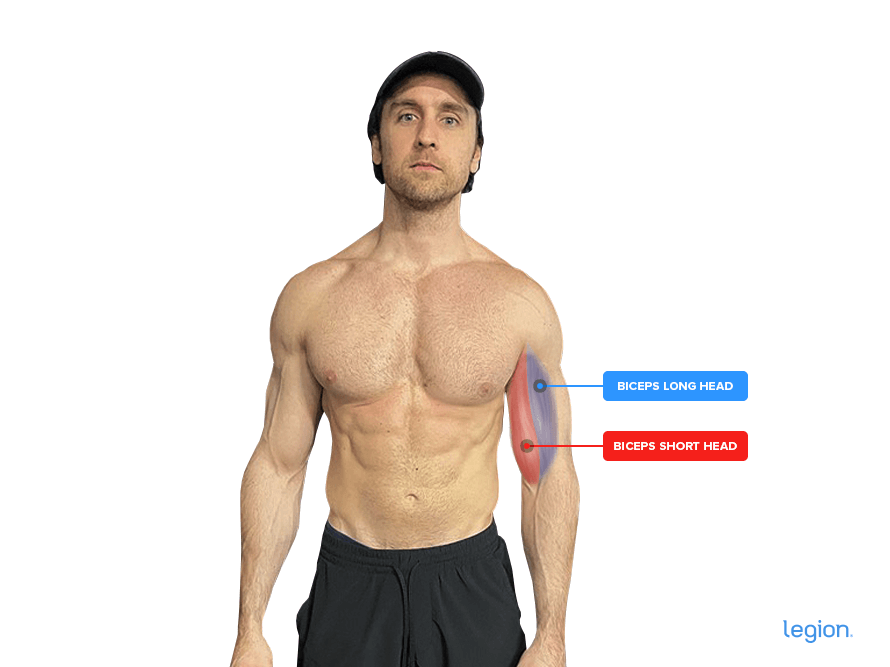
Building the long and short heads of the biceps will add significant size to your upper arms. But if you want truly stand-out biceps, there’s another arm muscle you should know about: the biceps brachialis.
The brachialis is the small muscle beneath the biceps brachii that, when well-developed, separates the biceps and triceps and adds to the biceps’ size and circumference. Here’s how it looks:
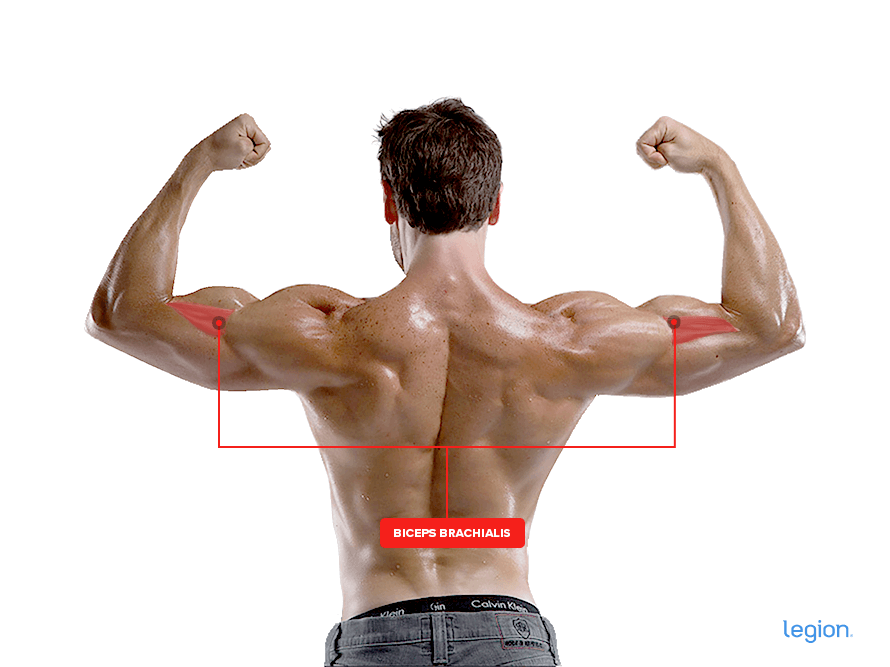
While all biceps exercises train the biceps, only some emphasize the brachialis. In this article, you’ll learn exercises for training all parts of the biceps and how to tie them together into full biceps workouts that help you develop overall mass and strength.
The Science of Biceps Training
The internet is full of theories on how to create effective biceps workouts for mass.
Unfortunately, most of them fall short.
Here’s the scientifically backed formula for building sleeve-splitting biceps:
1. Use compound and isolation exercises.
While many think the best biceps workouts for building arm mass only contain isolation exercises, research shows that workouts containing compound and isolation exercises yield better results.
Thus, your full biceps workouts should include both compound and isolation exercises.
2. Lift heavier weights over time.
Progressive overload refers to making your workouts more challenging over time, and it’s important because research shows it’s one of the best ways to maximize the muscle-building effects of weightlifting.
Here’s the easiest way to implement it:
If your biceps workout calls for 4-to-6 reps of the chin-up and you get 6 reps for a set, add 10 pounds to your next set.
If you manage 3 or fewer reps with the new weight, reduce the weight by 5 pounds to ensure you stay in the 4-to-6 rep range.
Follow this pattern of trying to add reps or weight to every exercise in every full biceps workout.
3. End sets of biceps exercises 1-to-3 reps shy of muscular failure.
To maximize your results, studies show you must take most of the sets in your biceps workouts to within a rep or two of failure.
Ask yourself at the end of each set, “If I had to, how many more reps could I have gotten with good form?” If the answer is more than two, increase the weight or reps to make your next set more challenging.
4. Train your biceps in various positions.
Research shows that varying the position of your shoulder and upper arm while you perform biceps exercises trains your arm muscles in different ways, helping you build big, proportional biceps.
So, instead of only training your biceps with exercises that position your arms at your sides (e.g., barbell and dumbbell curls), do exercises that position them behind your body (e.g., incline dumbbell curls) and in front of your body (e.g., chin-ups, pull-ups, and preacher curls).
5. Use the right cues.
Weightlifting cues are mental mantras that draw your attention to particular aspects of your form.
Two worth using in your biceps workouts for mass are:
- Squeeze the muscle: Research shows that focusing on squeezing your biceps during every rep can help you build significantly more muscle than thinking about another aspect of your form.
- Slow the eccentric: Research shows that controlling the eccentric (lowering) portion of a biceps curl is a very effective way to boost muscle growth. Aim to take around 1-to-2 seconds for both the lifting and lowering portions of each rep.
The Best Biceps Exercises
Ignore the muscle mags—you don’t need to do fifty types of curls to build great biceps.
Below are the 7 best biceps exercises for adding mass to your upper arms:
1. Chin-up
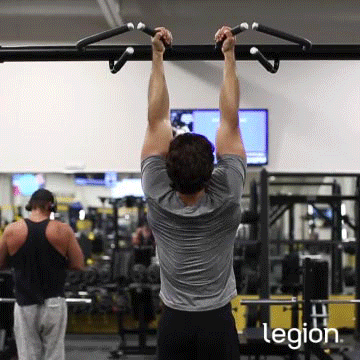
The chin-up trains your biceps to a high degree, allows you to lift heavy weights safely, and progress regularly, making it one of the best biceps exercises you can do.
2. Pull-up
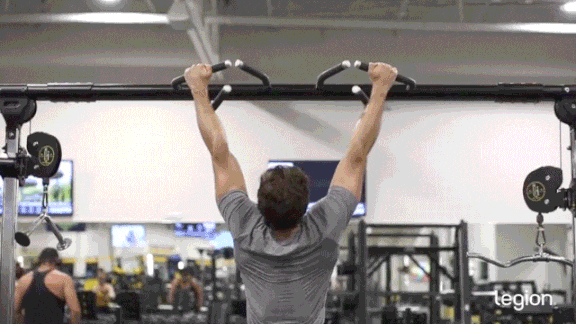
Like the chin-up, the pull-up is a compound exercise that allows you to handle heavy weights, making it ideal for adding mass to your upper arms.
3. Barbell Curl
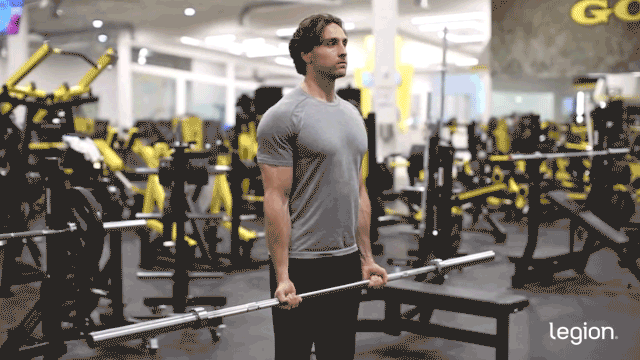
The barbell curl allows you to handle heavier weights than most “curl” exercises. It also trains your biceps through a full range of motion, which is why any good biceps workout for mass includes the barbell curl.
4. Preacher Curl
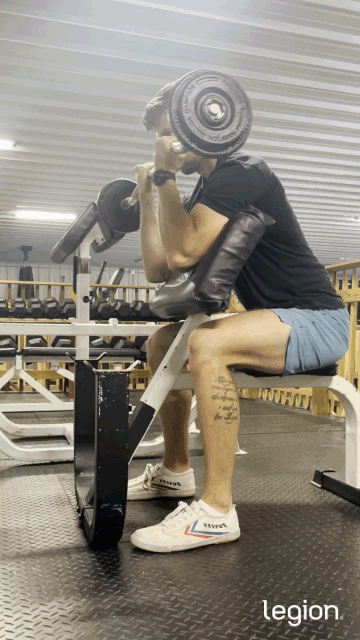
In the preacher curl, you use a bench to hold your arms in front of your body, which prevents you from using momentum to “cheat” the weight up and ensures your biceps do the majority of the work.
5. Incline Dumbbell Curl
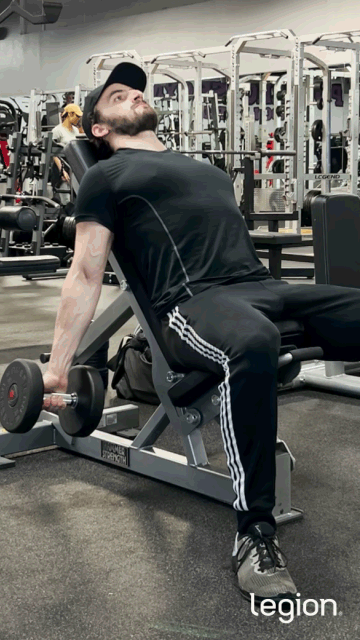
The incline dumbbell curl places high tension on the biceps throughout the entire range of motion and trains your biceps while stretched, which likely benefits growth.
6. Alternating Dumbbell Curl
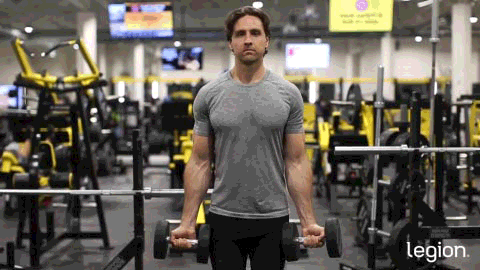
Alternating dumbbell curls are a staple in most biceps workout routines because they’re easy to learn and perform, and they train the entire biceps through a full range of motion.
7. Hammer Curl
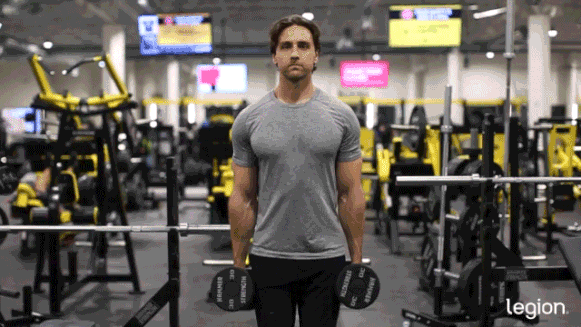
The hammer curl emphasizes the brachialis, which helps make your upper arms look bigger and improves the appearance of your biceps long heads.
The Ultimate Biceps Workouts for Mass and Strength
Now that you know the best biceps exercises, let’s cover how to organize them into effective biceps workouts for mass and strength.
The following workouts contain all the best exercises and the perfect amount of volume and intensity to spur biceps growth without wearing you to a frazzle.
For best results, do Biceps Workout #1 once weekly for 8-to-10 weeks as part of a well-designed training program, take a deload, and then replace Biceps Workout #1 with Biceps Workout #2 for the following 8-to-10 weeks.
After that, you can follow the same pattern every 8-to-10 weeks of training or create your own biceps workouts using the exercises above.
Biceps Workout for Mass #1
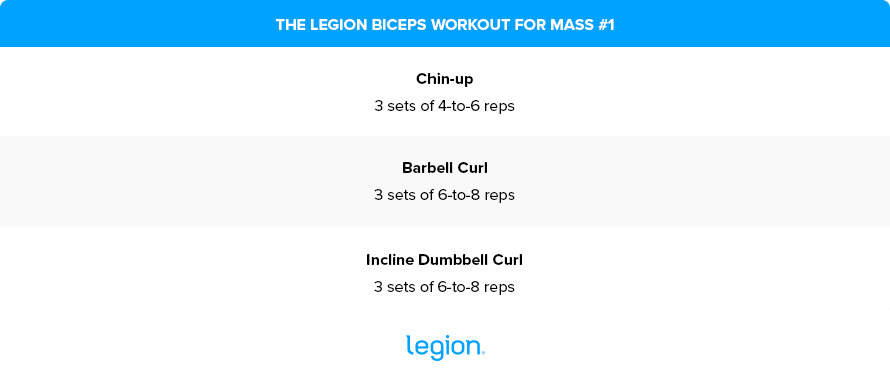
Biceps Workout for Mass #2
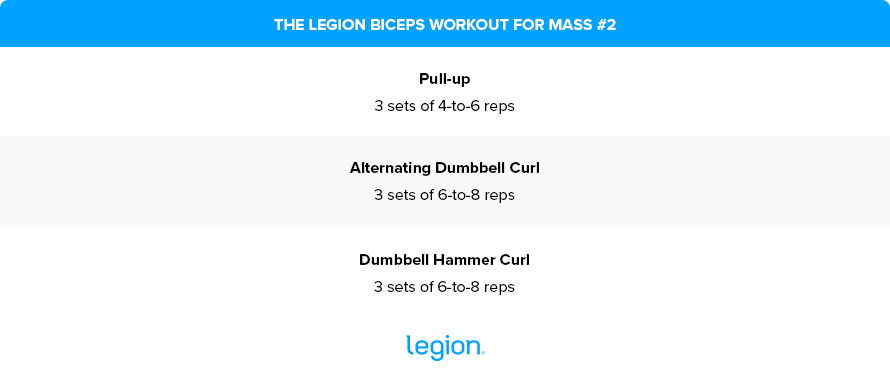
The Best Supplements to Support Your Full Biceps Workouts
Use the following supplements to optimize the results from your biceps workouts:
- Protein powder: Protein powder, such as whey or casein, provides your body with the nutrients needed to build muscle tissue and recover from workouts.
- Creatine: Creatine supplements, such as creatine monohydrate powder and gummies, boost muscle and strength gain, improve anaerobic endurance, and reduce muscle damage and soreness from your workouts.
- Pre-workout: A high-quality pre-workout enhances energy, mood, and focus, increases strength and endurance, and reduces fatigue.
(If you’d like even more specific advice about which supplements you should take to reach your health and fitness goals, take the Legion Supplement Finder Quiz, and in less than a minute, you’ll know exactly what supplements are right for you.)
Biceps Workouts for Mass: FAQs
FAQ #1: How many biceps exercises should I do?
A good biceps workout should include 3-to-4 exercises. This is enough to train your biceps in different positions and through various ranges of motion, which is important for maximizing growth.
FAQ #2: Are chin-ups the best biceps exercise?
Chin-ups are a top-tier biceps exercise because they allow you to lift heavy weights safely and progress regularly. But it’s hard to call them the “best” biceps exercise because each person is unique; what’s optimal for you might not be for someone else.
Instead of looking for the “perfect” biceps exercise, a better option is to include a number of biceps exercises in your workouts that train your biceps in different ways. Doing so is the best way to maximize growth.
FAQ #3: How do you grow your biceps fast?
To add mass to your biceps as quickly as possible, train them with 10-to-20 weekly sets. If you’re new to weightlifting (less than a year of weightlifting experience), 10-to-15 sets spread over 1-to-2 workouts is sufficient. If you’re more experienced, aim for 15-to-20 sets spread over 2-to-3 workouts per week.
Remember, not all of this volume must come from biceps isolation exercises—compound exercises that train the biceps (pull-ups, chin-ups, rows, etc.) count, too.
Beyond this, take most of your sets to within a few reps of failure, eat plenty of protein and calories, and get adequate rest, and your biceps will grow lickety-split.
Scientific References +
- Gentil, Paulo, et al. “Single vs. Multi-Joint Resistance Exercises: Effects on Muscle Strength and Hypertrophy.” Asian Journal of Sports Medicine, vol. 6, no. 1, 22 Mar. 2015, www.ncbi.nlm.nih.gov/pmc/articles/PMC4592763/, https://doi.org/10.5812/asjsm.24057.
- Schoenfeld, Brad J. “The Mechanisms of Muscle Hypertrophy and Their Application to Resistance Training.” Journal of Strength and Conditioning Research, vol. 24, no. 10, 2010, pp. 2857–72, https://doi.org/10.1519/JSC.0b013e3181e840f3.
- Oliveira, Liliam F., et al. “Effect of the Shoulder Position on the Biceps Brachii Emg in Different Dumbbell Curls.” Journal of Sports Science & Medicine, vol. 8, no. 1, 1 Mar. 2009, pp. 24–29, www.ncbi.nlm.nih.gov/pmc/articles/PMC3737788/.
- Kholinne, Erica, et al. “The Different Role of Each Head of the Triceps Brachii Muscle in Elbow Extension.” Acta Orthopaedica et Traumatologica Turcica, vol. 52, no. 3, 1 May 2018, pp. 201–205, www.ncbi.nlm.nih.gov/pmc/articles/PMC6136322/, https://doi.org/10.1016/j.aott.2018.02.005.
- Schoenfeld, Brad Jon, et al. “Differential Effects of Attentional Focus Strategies during Long-Term Resistance Training.” European Journal of Sport Science, vol. 18, no. 5, 13 Mar. 2018, pp. 705–712, https://doi.org/10.1080/17461391.2018.1447020.
- Farthing, Jonathan P., and Philip D. Chilibeck. “The Effects of Eccentric and Concentric Training at Different Velocities on Muscle Hypertrophy.” European Journal of Applied Physiology, vol. 89, no. 6, 1 Aug. 2003, pp. 578–586, https://doi.org/10.1007/s00421-003-0842-2.
- Youdas, James W, et al. “Surface Electromyographic Activation Patterns and Elbow Joint Motion during a Pull-Up, Chin-Up, or Perfect-PullupTM Rotational Exercise.” Journal of Strength and Conditioning Research, vol. 24, no. 12, Dec. 2010, pp. 3404–3414, https://doi.org/10.1519/jsc.0b013e3181f1598c.
- Sato, Shigeru, et al. “Elbow Joint Angles in Elbow Flexor Unilateral Resistance Exercise Training Determine Its Effects on Muscle Strength and Thickness of Trained and Non-Trained Arms.” Frontiers in Physiology, vol. 12, 16 Sept. 2021, https://doi.org/10.3389/fphys.2021.734509.
- Stokes, Tanner, et al. “Recent Perspectives Regarding the Role of Dietary Protein for the Promotion of Muscle Hypertrophy with Resistance Exercise Training.” Nutrients, vol. 10, no. 2, 7 Feb. 2018, p. 180, www.mdpi.com/2072-6643/10/2/180/pdf, https://doi.org/10.3390/nu10020180.
- Eckerson, Joan M., et al. “Effect of Creatine Phosphate Supplementation on Anaerobic Working Capacity and Body Weight after Two and Six Days of Loading in Men and Women.” The Journal of Strength and Conditioning Research, vol. 19, no. 4, 2005, p. 756, https://doi.org/10.1519/r-16924.1.
- Bassit, Reinaldo Abunasser, et al. “Effect of Short-Term Creatine Supplementation on Markers of Skeletal Muscle Damage after Strenuous Contractile Activity.” European Journal of Applied Physiology, vol. 108, no. 5, 3 Dec. 2009, pp. 945–955, https://doi.org/10.1007/s00421-009-1305-1.










